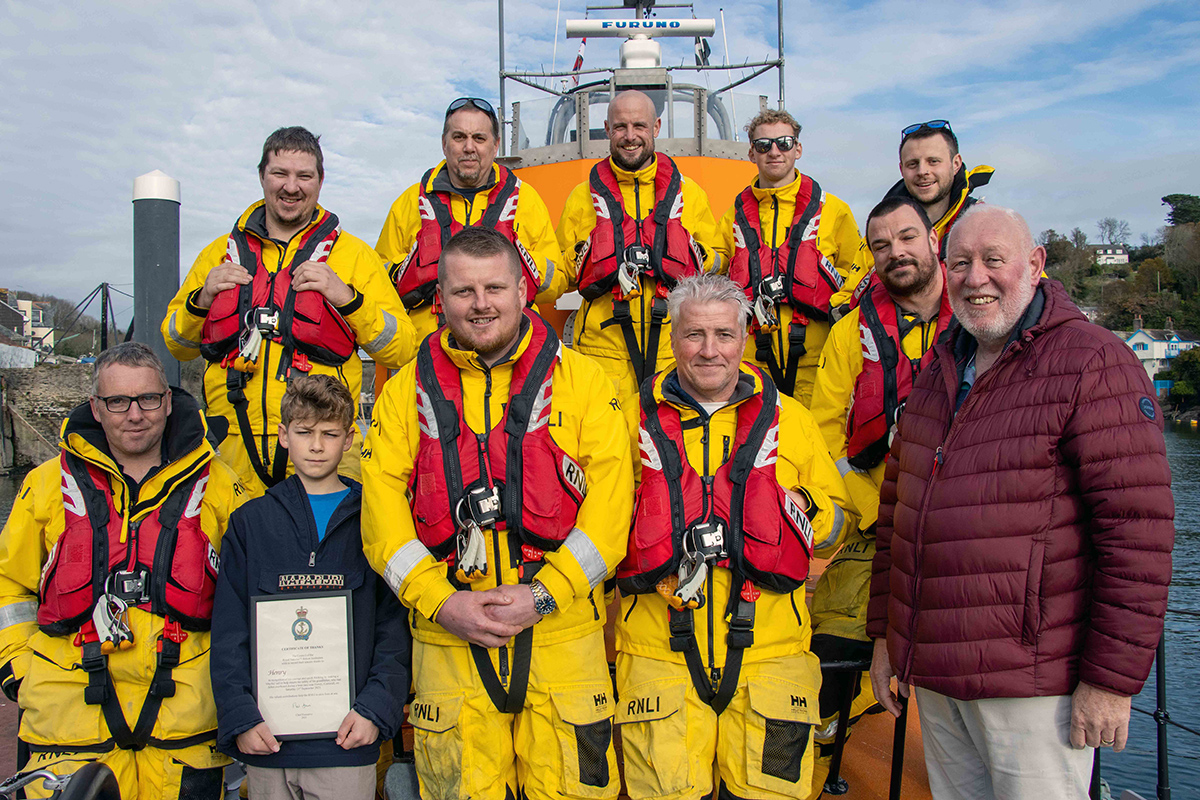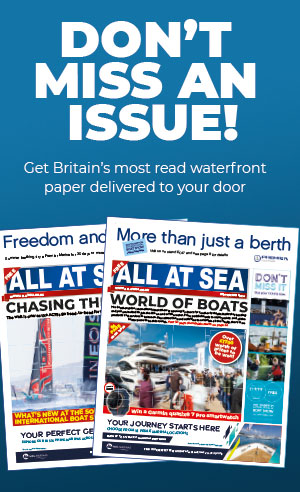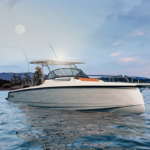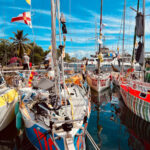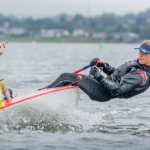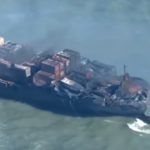Henry and his grandfather David Richards returned to Fowey lifeboat station on Saturday to meet the crew who helped save David after he fell overboard from a sailing boat.
Henry’s quick-thinking actions to make a mayday call over the VHF radio helped save his grandad’s life that day, and he was surprised with a certificate of thanks from the RNLI, presented by Fowey RNLI crew.
On Saturday 23 September, 70-year-old David Richards and his grandson 13-year-old Henry were taking part in an afternoon sailing race in St Austell Bay. During the race, David fell overboard, leaving 13-year-old Henry alone on the five-metre sailing boat.
Henry managed to stay calm and collapsed the yacht’s spinnaker before using the VHF radio to make a mayday call. Falmouth Coastguard immediately requested both Fowey RNLI lifeboats to be launched, and a Coastguard helicopter was also sent to the scene.
Henry and his family went to Fowey RNLI on Saturday morning to meet the crew and talk through the incident. And Henry was surprised with a certificate of thanks from the RNLI’s Chief Executive Mark Dowie in recognition of his courage and quick thinking that day, which was presented to him by Fowey RNLI volunteer crew Jimmy Hoddinott, who was helm on the D class lifeboat that day.
He said: ‘It was fantastic to see Henry with his family, and in a much better situation than we first met back in September! We were so happy to officially congratulate him for making a Mayday call so calmly in an very scary situation, it was a lovely surprise for him. He is very inspiring and I hope his story will inspire other young people to learn an important skill that can make the difference in saving someone’s life.’
Henry lives in Par and has been sailing since the age of six. He explained what happened: ‘We put the spinnaker up because we thought it would make us go faster but it made the boat uncontrollable, and it was tipping a lot and Pops fell off. I knew I had to take it down.
‘Pops was wearing a lifejacket so I didn’t think he would drown, but I knew he would get cold, so I knew I needed to call the Coastguard for help.
‘My mum had been on a VHF radio course and has the qualification. She still had the books from the course, and I’d read them two weeks earlier, so I remembered how to make a mayday call.
‘I couldn’t see Pops in the water. When the helicopter and the RNLI lifeboat came, I could see they were all in one area, but I couldn’t see Pops, especially with the big waves.
‘I was a bit frightened at the start, [when he first fell in], when I wasn’t sure what to do and then I saw the radio.
‘When I saw Pops at the lifeboat station, he had a changing robe around him, and was sitting on the chair. I was relieved to see him there.’
Fowey RNLI lifeboats were launched at around 3.30pm following Henry’s mayday call and made best speed to David’s position just off Gribben Head. On arrival, Fowey RNLI volunteers found that David had drifted roughly 200m away from his sailing boat and had been treading water. He had been in the water for around 20 minutes and was tiring.
Fowey RNLI volunteers aboard the all-weather lifeboat retrieved David from the water, and a volunteer crew member boarded the boat with Henry and helped sail it back into Fowey harbour.
David was taken to hospital by ambulance to be checked over and was released later that evening.
David, from Fowey, explained the incident from his perspective: ‘The wind that had been expected to come in increasing force later in the day, actually came in earlier that day. We were falling further and further behind in the race, and I thought we should put the spinnaker up. As soon as we got it flying, we immediately got into difficulty. There was a gust of wind that knocked the boat down and I didn’t have my feet in the boat’s toe straps, so I just slid into the water between the boom and the boat.
‘Once Henry was on the boat on his own, I could see that he wasn’t in control of the boat, but he got the spinnaker down in an emergency fashion. It meant that the boat was much more stable.
‘What went through my mind initially was that I couldn’t get back to the boat because it was running away from me. I lay on my back in the water and thought: Henry, use the radio, Henry, use the radio and he did. He hit the Channel 16 button to put it onto the emergency frequency and then gave his mayday call. He used the radio as if he was a pro.
‘What Henry did makes me very proud. He kept his head. He did everything he should have done. He got the boat under control and radioed for help. He couldn’t have done anything better.
‘Henry is such a level-headed and intelligent boy, what he did shouldn’t surprise me. I’m exceptionally grateful that he had the presence of mind to do what he did.’







